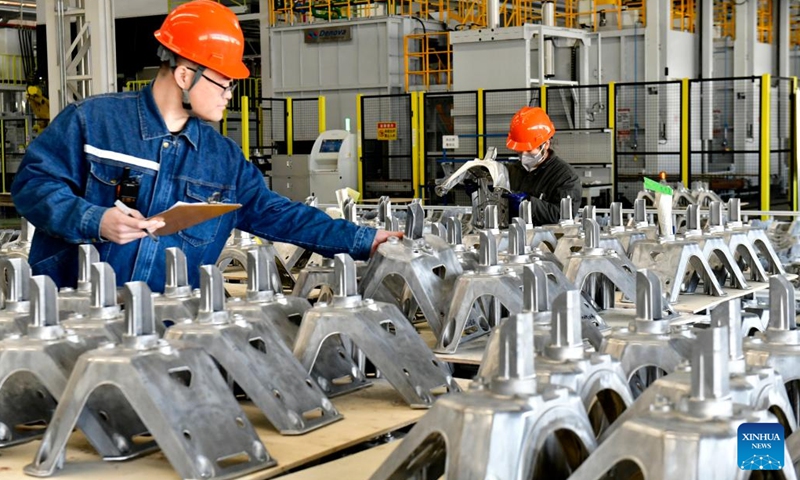China to roll out 3 trillion yuan of high-quality projects to boost private sector participation: NDRC official

Workers check aluminum alloy components at a company in Binzhou, east China's Shandong Province, Feb. 26, 2025. Binzhou City is a major hub for private enterprises. In recent years, the city has fostered the development of the private economy through comprehensive and end-to-end services. (Photo/Xinhua)
Chinese officials on Thursday introduced various measures to implement the country's first fundamental law dedicated to promoting the private sector, which will take effect on May 20 after being passed at a session of the Standing Committee of the National People's Congress on April 30.
The formulation and enactment of the Private Sector Promotion Law will institutionalize the guiding principles and policies of the Chinese government regarding the private economy, as well as codify effective practices and proven experiences from practical implementation, said Wang Zhenjiang, a vice minister of justice, at a conference.
This legal framework aims to consolidate reform achievements, foster a rule-of-law-based environment and social ecosystem conducive to the coordinated development of diverse ownership economies, including private enterprises, and continuously reinforce China's economic stabilization and recovery momentum while consolidating the foundation for sustained long-term growth, Wang said.
The implementation of the law will further stabilize the expectations, consolidate confidence, and promote high-quality development, said Zheng Bei, a deputy head of the National Development and Reform Commission (NDRC), China's economic planner, at the press conference held by the State Council Information Office.
Zheng noted that the law strengthens development certainty through legal stability, serving as a reassurance anchor for private enterprises to focus on growth. Moreover, it actively addresses the concerns of private businesses through deliberate institutional arrangements. The law embodies the principles of equal treatment, fair competition, equal protection, and common development, which are fully reflected not only in the general provisions but also in chapters addressing fair competition, investment and financing facilitation, technological innovation, and legal liabilities, Zheng said.
Amid the current complex and challenging external environment, integrating private enterprises into the national governance system through legal institutionalization will better unleash their innovative potential and empower them to drive economic growth, expand employment, improve livelihoods and advance technological innovation, Wang Yu, president of Spring Airlines, told the Global Times on Thursday.
Looking ahead, Wang said that he is confident that legal frameworks will translate into tangible productive forces, and enterprises aligned with compliance standards, digital transformation and global connectivity will undoubtedly usher in a "golden era of development."
Regarding fair market competition, the law stipulates a nationally unified market access negative list system. In terms of equal access to production factors, it mandates state guarantees for private entities to utilize capital, technology, human resources, data, land, and public service resources on par with other market players, according to Zheng.
The law addresses industry pain points by adopting a dual-driver approach of facilitating investment and financing, as well as vigorously supporting technological innovation, providing an institutional framework to break development bottlenecks for technology-oriented private enterprises. Once proactive measures such as financial support, major projects and scientific research initiatives are fully implemented, private enterprises will see significant alleviation of financial pressure, accelerate the transformation of technologies from research and development to application, further strengthen artificial intelligence empowerment and reinforce security safeguards in critical areas like the digital economy and critical infrastructure protection, said Qi Xiangdong, chairman of Qi An Xin Technology Group, a Chinese cybersecurity firm.
Qi told the Global Times that the law also systematically optimizes the business environment through dimensions including fair competition and efficient government services.
Zheng said that the NDRC is accelerating the improvement of long-term mechanisms for private enterprises to participate in major project construction. She noted that the NDRC will introduce premium projects totaling approximately 3 trillion yuan ($415.20 billion) in key sectors, including transportation, energy, water conservancy, new infrastructure, and urban infrastructure.
The NDRC has already launched several significant projects in nuclear power, railways, and other sectors, with private capital holding up to 20 percent equity participation in certain nuclear power projects, while in areas like industrial equipment renewal and resource recycling, and reuse, private enterprises contribute over 80 percent of the investment.
Cong Lin, a vice minister of National Financial Regulatory Administration (NFRA), stated that the NFRA is conducting equity investment pilot programs through financial asset investment companies to support technology innovation enterprises, having established 74 private equity investment funds thus far. Additionally, merger and acquisition loan services tailored for tech enterprises have been rolled out in 18 pilot cities, facilitating smoother capital circulation for technology companies.
The private economy plays a ballast stone role in China's economic development, contributing to balancing regional development as well as bolstering the advancements of industrial upgrading, Wang Peng, an associate research fellow at the Beijing Academy of Social Sciences, told the Global Times on Thursday.
The law elevates private enterprises from "policy beneficiaries" to "institutional stakeholders" through institutionalized safeguards and innovative policy instruments. The development not only stimulates economic growth and job creation, but also promotes China's economy to an innovation-driven, open and inclusive high-quality development model through the technology spillover effect and global resource integration, said Wang.
Photos
Related Stories
- New Development Bank to usher in new golden decade of high-quality development: bank president
- China sees surge in new "digital intelligence" jobs
- Stories of High-Quality Development | Li Zhaoqian: Challenges faced by the private economy are surmountable
- China's top legislature to further advance legislation to support private economy
- China's top legislator calls for maintaining confidence, leveraging strength
Copyright © 2025 People's Daily Online. All Rights Reserved.









